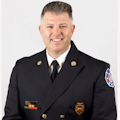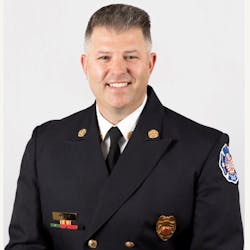Annually at about this time of year, I would have spent the past few months in one of my happy places: on the saltwater on the Gulf of Mexico on my boat. However, I am in Missouri this year, and the last bit of saltwater that I experienced was on my driveway after it iced and I treated it this past winter. Of course, not one rainbow trout or flounder to be found.
Fishing on a boat on the Gulf Coast has taught me many life lessons, which helped my recognition of situational awareness and my ability to problem solve, to build resilience in the face of challenges and to respect that sometimes you just get rocked. Regarding that last matter, navigating loss can be difficult, regardless of where you are in your life’s journey.
Losing your way at times, particularly over a career, is normal: The tide ebbs and flows, rises and falls, and even at times erodes the shoreline of predictability. So, how do we, as leaders, navigate loss and confusion? What leadership lessons move us toward finding our way, reconciling differences (internal and external) and rejuvenating a career, to ride high on a cresting wave where we leave lasting impression on the fire service?
Navigation through frustration
One of the most frustrating experiences that I had on my boat (it was an older boat at the time) was losing navigation during a storm. As the gray skies worsened and an offshore storm moved inland, our fishing day was cut short. The winds picked up, and wave height moved from 1–2 feet to 3–4 feet, with a wave interval of 10–12 seconds. That basically means that the waters were getting rough, and it was time to head in.
As we ran in the rain across the bay, with the GPS set for the Intracoastal Waterway, we were struck by one big wave slam, and there went the GPS. That isn’t a great feeling when you barely can see because of wind and rain amid worsening weather.
Without time nor conditions on our side to try to figure out why we lost our GPS, we used what mariners have used for centuries: our compass. With a northeastern approach—the direction that would take us toward safety—we could get back to shore.
What’s to learn about leadership from this example?
Navigation is part and parcel of leading through difficult and frustrating times. Furthermore, finding one’s way by “navigating” can mean so many different things to different people.
It isn’t unusual to find that a change of scenery is what you need to put the joy back into enjoying the job.
Maybe you need to look inward. Perhaps it’s worthwhile to self-reflect on your attitude. Either of these might allow you to grow in a different direction.
Maybe you simply need someone to remind you of your “true north,” where you dig deep into your core values and establish a philosophy of leadership in action that can change culture for the good.
It’s OK to be frustrated in the role of officer, in the calling of leader, but how you navigate the frustration matters, because others look to leaders, well, to lead.
So, be passionate enough to realign with your inner compass and drive toward a place of stability and joy, even as frustration attempts to disrupt navigation.
Ride the wave
Waves are an impressive sight, whether you view them in the surf, near offshore or offshore. As well, the sound of a wave can be one of the most calming and relaxing sounds that a person could hope for. On the other hand, the sheer power of a wave literally can rock your world: It can knock you off of your feet and push you in all directions uncontrollably.
Riding a wave out to sea and back to shore is such an antithetical experience. How a boat handles, and how the captain handles the boat, can be the difference between a smooth ride and a rough ride.
How do we reconcile two opposing waves, when, as leaders, we feel loss? What can we learn as “boat captains” that helps us as officers and, more importantly, as leaders?
With so much to save, we must ride the wave. That said, often, people create waves that oppose reconciliation of relationships, values and forward movement.
When a wave knocks you down and turns you around, you first must choose to either ride the wave in or turn and face the next wave. However, here is the deal: Riding with the wave always is going to be a smoother, calming, predictable ride. It can provide some rest, recentering and reconciliation, to the power of “going with the flow” with ease.
However, if you never ride against the wave out to sea, you never appreciate the calmness of riding the wave back to shore. You see, riding against the wave is necessary, not just to enjoy the return trip but to build a sense of grit; to increase focus on your destination; to trust your internal GPS and compass for navigation; to take proper precautions for the rogue wave; and to recognize the importance of wave intervals, so you can adjust and adapt accordingly.
These lessons translate to leaders who focus on personal reconciliation, relational reconciliation, and how one chooses to experience the rough ride out and the smooth ride in. We, as servant leaders, have so much to save through sacrifice, even when a wave knocks us down.
The character crest awaits just on the next wave, so ride it, adjust as a result of it, adapt and find that joyful place where reconciliation leads to rejuvenation.
Let out your sails
Leadership—authentic leadership—centers more on failure than success, which is subjective at its core. As leaders, rejuvenation in loss, frustration and reconciliation can raise us up just as the tides rise, so we rise together. Just as the tides lessen, we lessen together, and the important leadership lesson “in the boat” is that we are in the boat together, navigating changing directions, reconciling opposing views, and rejuvenating a place, a person, possibly a career.
As the tides ebb and flow, together, as one team, so shall we go.
About the Author

Dr. Brett Ellis
Dr. Brett Ellis is a 27-year veteran of the fire service and serves as the fire chief for the city of Webster Groves, MO. He holds a bachelor’s degree in fire administration from Western Illinois University, a master’s degree in leadership and adolescent development from Huntington University and a doctorate in education from Concordia University-Portland. As a consultant (AGILE Leadership Consulting Inc.), Ellis focuses on leadership, firefighter behavioral health, conflict resolution, officer development, organizational movement, relationship building and personnel role plays that are based on fire service lawsuits. As well, he teaches for the National Fire Academy and Columbia Southern University.
